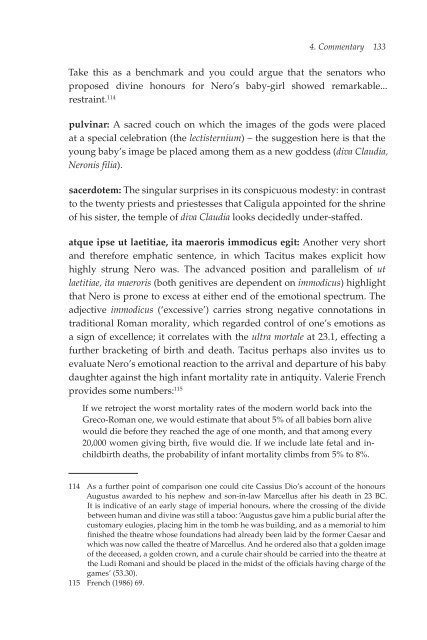Tacitus, Annals, 15.20-23, 33-45. Latin Text, Study Aids with Vocabulary, and Commentary, 2013a
Tacitus, Annals, 15.20-23, 33-45. Latin Text, Study Aids with Vocabulary, and Commentary, 2013a
Tacitus, Annals, 15.20-23, 33-45. Latin Text, Study Aids with Vocabulary, and Commentary, 2013a
Create successful ePaper yourself
Turn your PDF publications into a flip-book with our unique Google optimized e-Paper software.
Take this as a benchmark <strong>and</strong> you could argue that the senators who<br />
proposed divine honours for Nero’s baby-girl showed remarkable...<br />
restraint. 114<br />
A sacred couch on which the images of the gods were placed<br />
at a special celebration (the lectisternium) – the suggestion here is that the<br />
young baby’s image be placed among them as a new goddess (diva Claudia,<br />
Neronis filia).<br />
The singular surprises in its conspicuous modesty: in contrast<br />
to the twenty priests <strong>and</strong> priestesses that Caligula appointed for the shrine<br />
of his sister, the temple of diva Claudia looks decidedly under-staffed.<br />
Another very short<br />
<strong>and</strong> therefore emphatic sentence, in which <strong>Tacitus</strong> makes explicit how<br />
highly strung Nero was. The advanced position <strong>and</strong> parallelism of ut<br />
laetitiae, ita maeroris (both genitives are dependent on immodicus) highlight<br />
that Nero is prone to excess at either end of the emotional spectrum. The<br />
adjective immodicus (‘excessive’) carries strong negative connotations in<br />
traditional Roman morality, which regarded control of one’s emotions as<br />
a sign of excellence; it correlates <strong>with</strong> the ultra mortale at <strong>23</strong>.1, effecting a<br />
further bracketing of birth <strong>and</strong> death. <strong>Tacitus</strong> perhaps also invites us to<br />
evaluate Nero’s emotional reaction to the arrival <strong>and</strong> departure of his baby<br />
daughter against the high infant mortality rate in antiquity. Valerie French<br />
provides some numbers: 115<br />
If we retroject the worst mortality rates of the modern world back into the<br />
Greco- Roman one, we would estimate that about 5% of all babies born alive<br />
would die before they reached the age of one month, <strong>and</strong> that among every<br />
20,000 women giving birth, five would die. If we include late fetal <strong>and</strong> in -<br />
childbirth deaths, the probability of infant mortality climbs from 5% to 8%.<br />
114 As a further point of comparison one could cite Cassius Dio’s account of the honours<br />
Augustus awarded to his nephew <strong>and</strong> son-in-law Marcellus after his death in <strong>23</strong> BC.<br />
It is indicative of an early stage of imperial honours, where the crossing of the divide<br />
between human <strong>and</strong> divine was still a taboo: ‘Augustus gave him a public burial after the<br />
customary eulogies, placing him in the tomb he was building, <strong>and</strong> as a memorial to him<br />
finished the theatre whose foundations had already been laid by the former Caesar <strong>and</strong><br />
which was now called the theatre of Marcellus. And he ordered also that a golden image<br />
of the deceased, a golden crown, <strong>and</strong> a curule chair should be carried into the theatre at<br />
the Ludi Romani <strong>and</strong> should be placed in the midst of the officials having charge of the<br />
games’ (53.30).<br />
115 French (1986) 69.


















